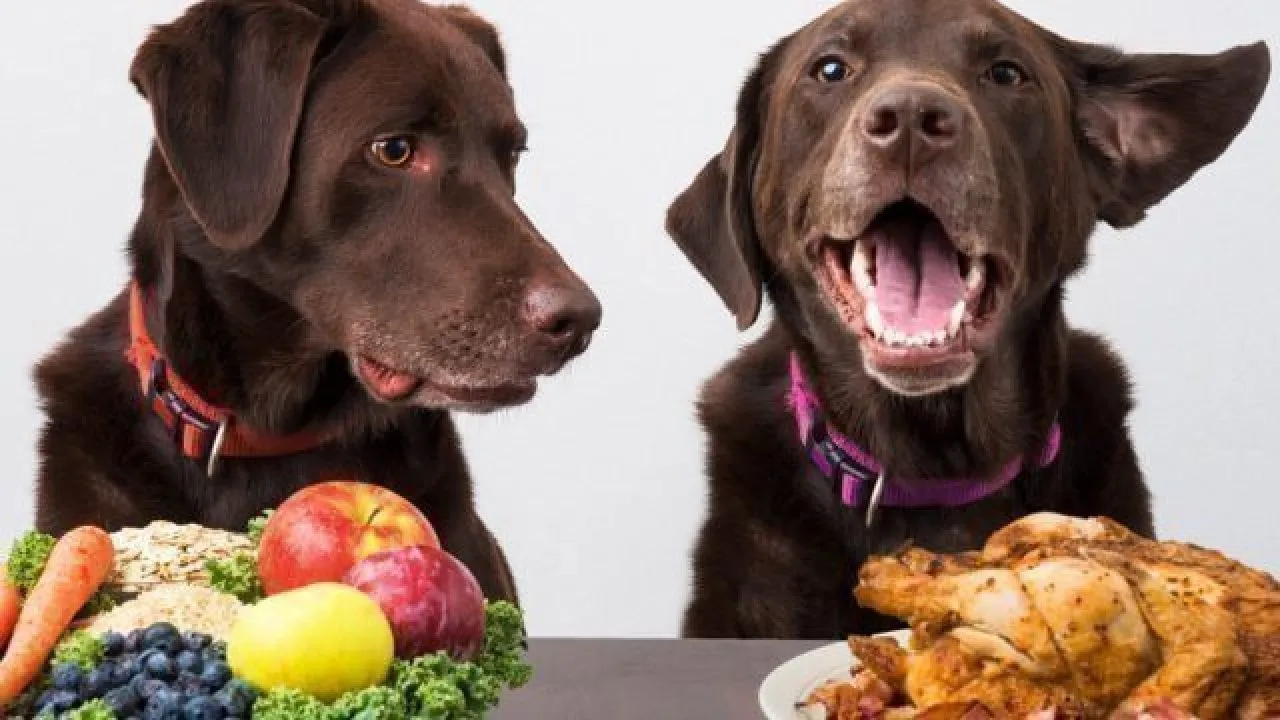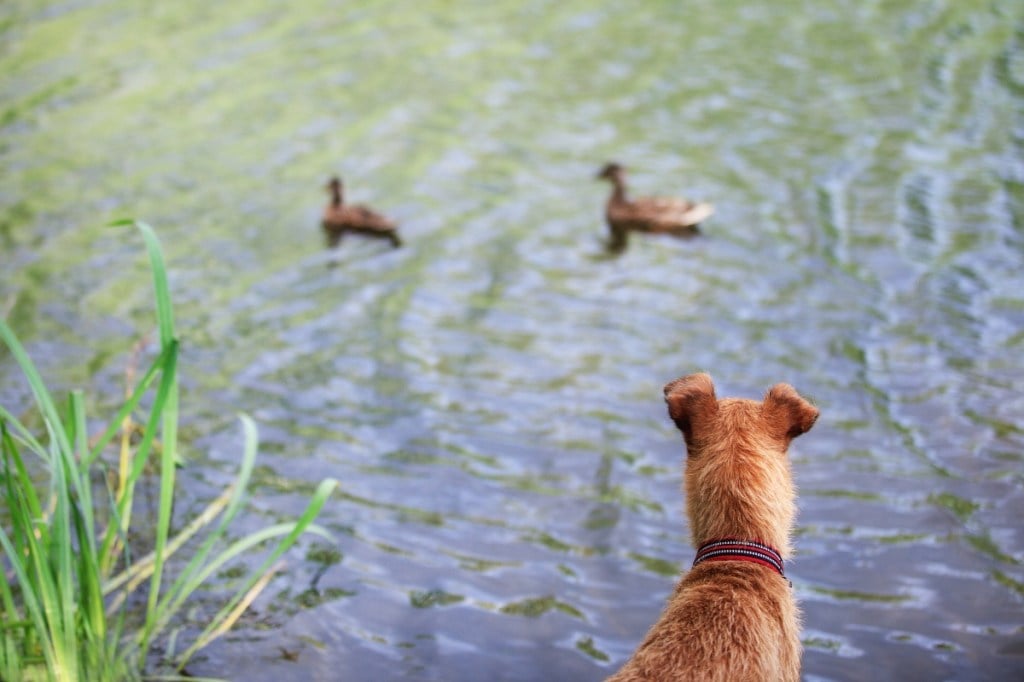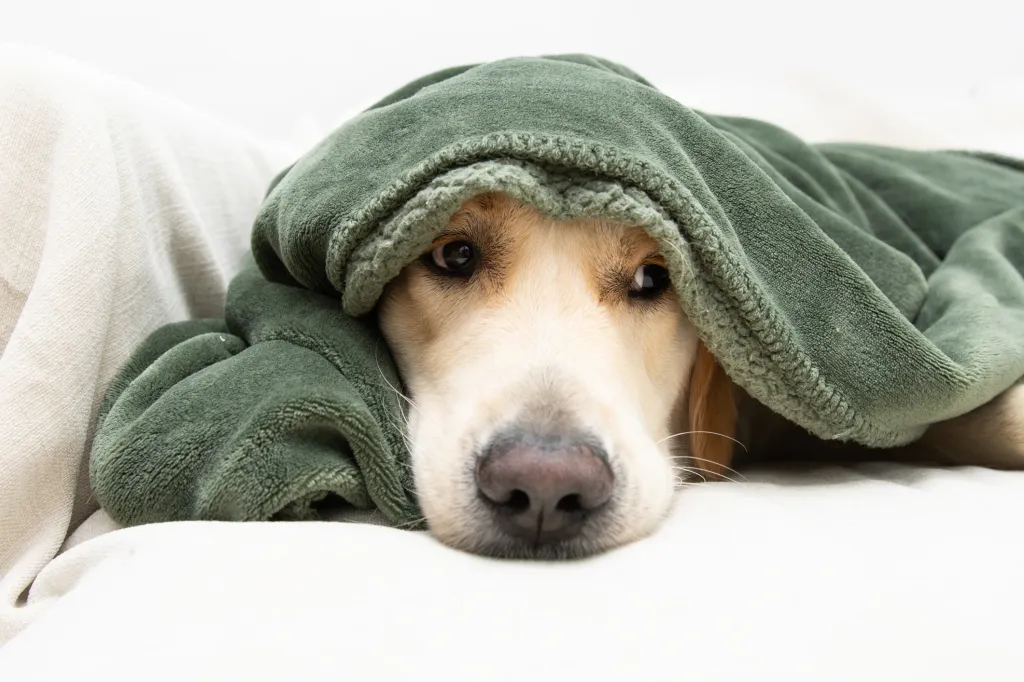Key Takeaways
- Some foods that humans eat are toxic or unsafe for dogs and cats.
- This is a comprehensive list of foods that dogs can and cannot safely eat.
- Go to your vet or an emergency animal hospital if your dog has eaten something poisonous.
- There is a pet poison helpline that you can also call for advice.
- Healthy Paws covers treatment for emergency ingestion incidents.
Sharing food is a universal way to bond with loved ones, including pets. However, some foods that are perfectly safe for people to eat can be toxic or unsafe for dogs and cats. Be sure you know what foods are safe to share with pets before offering your four-legged friend a bite off your plate.
Toxic ingestion emergencies: If your dog has eaten something poisonous, call or visit your local veterinarian or emergency veterinary hospital immediately.
Almonds:
No, it is not recommended that dogs eat almonds. Although these nuts are healthy for humans with vitamin E, magnesium, healthy fats, and protein, they are not easily digested by dogs. Almonds are not toxic to dogs but can cause gas, vomiting, diarrhea, and loss of appetite. They are also high in fat, which puts your dog at risk of pancreatitis and obesity. Call an emergency clinic if your dog has consumed many almonds.
Apples:
Yes, dogs can eat apples, and they are beneficial for providing fiber, antioxidants, and fresh breath. Just make sure to core and seed the apple before giving it to a dog to prevent choking. Many dogs love frozen apple slices and applesauce for summertime treats. However, some dogs are allergic to apples, and dogs with diabetes should not eat apples because they can raise blood sugar levels. Serve small portions of apples to reduce reactions.
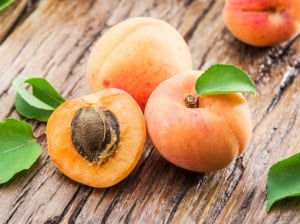 Apricots:
Apricots:
No, it is not a good idea to give apricots to your dog. Although the fruit of an apricot is safe for dogs, the pit and stem are toxic and pose choking hazards. If you give your dog apricot fruit in moderation, remove the pit and stem to prevent cyanide poisoning. Symptoms to watch for include difficulty breathing, dilated pupils, panting, constipation, and vomiting. If your dog swallows an apricot pit, seek immediate veterinary care.
Asparagus (unseasoned):
Yes, plain asparagus is a fine food for dogs. Too much can cause tummy upset, and make sure to leave off seasonings, butter, and oil. Asparagus is high in fiber and has antioxidants, folate, copper, and vitamins, C, E, and K. Raw asparagus is tough to digest, so cooking it is best. Make sure to cut it into tiny pieces to reduce the risk of choking. The inedible fern part of the plant is toxic.
Avocados:
No, you should not feed an avocado to your dog. Avocados contain persin that can cause upset stomach, and the large seed can obstruct a dog’s gastrointestinal tract. Dogs should also avoid avocado plants that are growing in your yard because persin exists in the seeds, leaves, bark, and fruit of avocados. If you think your dog swallowed an avocado seed, seek treatment from your vet right away.
Bananas (peeled):
Yes, as long as you remove the peel, bananas are safe for dogs. Bananas are low in sodium and cholesterol while being high in fiber, making them a healthy dog treat. They do have high amounts of natural sugars, which is why they are best served in moderation. Banana peels are non-toxic but difficult to digest and can cause blockages. Avoid giving dried banana chips to dogs because of the high sugar levels.
Beans:
Yes, dogs can eat some types of beans. Beans are heart-healthy foods with B-vitamins, iron, protein, potassium, fiber, magnesium, and antioxidants. However, beans can cause gas and should be fed only in moderation. Cooked pinto, black, kidney, soy, and garbanzo beans are non-toxic and beneficial for dogs. Green beans, cooked lentils, and lima beans without seasoning are also good foods for dogs and can be incorporated into homemade dog food.
Berries (small amounts):
Yes, most berries are good for dogs and work well as all-natural treats. For example, strawberries are safe for dogs and full of fiber, antioxidants, and vitamin C. Blackberries and raspberries are relatively safe for dogs but have naturally occurring xylitol, so limit these berries. Blueberries are great sweet treats for dogs. Most dogs don’t like cranberries, but they are not toxic for dogs. Avoid gooseberries, marionberries, serviceberries, and salmonberries.
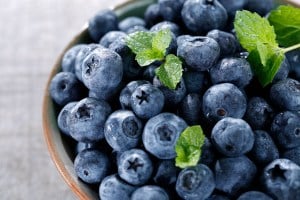 Blueberries (small amounts):
Blueberries (small amounts):
Yes, delicious blueberries are safe for dogs and enjoyed by many pups as a summertime treat. These berries are full of fiber, vitamin C, and antioxidants. They don’t need to be cut up before serving, even for small dog breeds. Just don’t overdo it with blueberries in your dog’s diet to prevent diarrhea or gastrointestinal upset. Never feed blueberry muffins, pie, or other deserts to dogs due to high sugar and the other ingredients.

Bread:
Yes, bread is safe for dogs to eat. However, bread should not be fed to dogs on a regular basis and only feed cooked bread in small portions. It does not have harmful side effects, but it also doesn’t have any real nutrients that your dog isn’t already getting from a normal canine diet. Never give your dog raw bread dough because it is toxic, and avoid flavors and toppings that make bread delicious for humans.
Broccoli (small amounts):
Yes, small quantities of broccoli are safe for dogs. Cut broccoli up into small pieces and serve it to your dog as an occasional treat. It has fiber and vitamin C, while being low in fat. However, limit the amount of broccoli you offer because it contains isothiocyanates that can irritate some dogs’ tummies. Both raw and cooked broccoli are fine for dogs, but just make sure to leave off any salt, garlic, or seasonings.
BBQ Foods:
Yes, your dog can enjoy some BBQ foods with you. Hamburger meat is a high-value treat; however, burgers for dogs should not have onions, garlic, or seasoning. Hot dogs and potato salad are not healthy for dogs, but salmon is safe if it is free of bones and seasoning. Dogs should definitely not drink beer, and ice cream can be problematic due to the sugar, lactose, and artificial sweeteners.
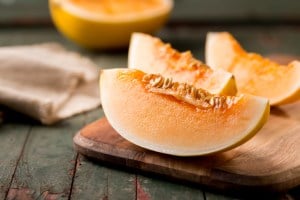 Cantaloupe:
Cantaloupe:
Yes, you can share cantaloupe with your dog. This is a low-calorie and hydrating fruit with vitamins A, B6, and C and also fiber, niacin, potassium, and folate. Cut cantaloupe into small pieces and remove the seeds as a safety precaution for choking. Remove the rind because it’s difficult to chew and digest too. Try pureeing fresh cantaloupe and freezing it in a Kong toy for a summertime treat!
Carrots:
Yes, carrots are safe for dogs to eat and one of the top vet-recommended foods. Either raw or cooked carrots are fine to give your dog because they are low in calories and a good source of fiber, vitamin A, and potassium. Lightly cooked or steamed carrots are more easily digested by dogs. Teething puppies benefit from chewing on cold carrots for relief. Just cut carrots up into small chunks to avoid choking.
Cashews:
No, it is not advised to feed cashews to dogs. They can cause GI issues and pancreatitis, and they are also high in fat. Eating cashews regularly can cause a dog to become obese. A few cashews here and there will not usually harm a dog though unless nut allergies are present. Mixed nuts, trail mix, and any cashews with salt or seasoning added should be avoided for the sake of your dog’s health.
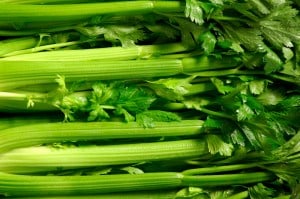 Celery:
Celery:
Yes, plain celery can be fed to dogs. It is rich in calcium, iron, sodium, phosphorus, and vitamins A, B, and C. Celery is mostly water and fiber, which makes it a healthy, hydrating snack. It’s a great food for overweight dogs to help them feel full longer. Substitute dog treats with celery and also get a teeth-cleaning benefit. Especially for fast eaters and small breeds, chop celery into small pieces to prevent choking.
Cheese (small amounts):
Yes, cheese is safe for dogs, and they often love the taste of it. Cheese is rich in protein and calcium, which are beneficial for dogs. However, it’s not necessarily the healthiest snack, so give your dog cheeses that are low in fat and sodium. Good options are mozzarella and cottage cheese. Cheese makes a great training treat, but make sure to give your dog cheese in moderation.
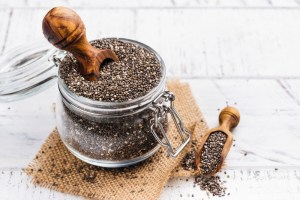 Chia Seeds:
Chia Seeds:
Yes, dogs can eat chia seeds just fine. Chia seeds are high in fiber and antioxidants, which helps a dog prevent constipation and stay active. They also have iron, zinc, potassium, phosphorous, and magnesium. Sprinkle chia seeds on meals for a health boost and to control blood sugar and improve overall health. They don’t need to be ground down before using them, but some vets recommend soaking seeds before serving to prevent choking.
Chicken (unseasoned):
Yes, dogs can eat chicken, and this is a primary ingredient in dog food. It is a safe protein source that dogs love. Chicken also has omega-3 fatty acids that are good for the skin and coat. Make sure that chicken is cooked and not raw to avoid bacterial infections. Be aware that some dogs are allergic to chicken and that bones must be removed since they are choking hazards. Lean breast meat is best.
Chickpeas:
Yes, you can feed your dog chickpeas, also known as garbanzo beans. These beans are safe as long as they are cooked plainly and do not contain any garlic, onion, or lemon juice. This is actually a common ingredient in natural dog foods and homemade dog food recipes. Chickpeas contain fiber, vitamins B and C, fiber, protein, potassium, magnesium, and folate. For dogs, choose fresh chickpeas rather than canned ones that contain too much sodium.
 Chocolate:
Chocolate:
No, dogs should never have chocolate. All cocoa-based products pose risks for dogs due to the theobromine and caffeine content that can affect the nervous system and heart rate. Cocoa, bitter, and dark chocolate are the most dangerous, while milk chocolate and white chocolate are less toxic but still should be avoided. Large amounts of chocolate can result in vomiting, diarrhea, rapid panting, increased heart rate, seizures, internal bleeding, heart attack, and other symptoms. Call your vet or a pet poison helpline ASAP if your dog has eaten chocolate.
Cinnamon (small amounts):
Yes, dogs can typically eat cinnamon without an issue. It is not toxic and has anti-inflammatory properties and antibacterial properties that are beneficial. Cinnamon may help regular blood pressure in diabetic dogs. However, don’t give too much cinnamon to your pup to avoid an upset stomach. Inhaling the spice can cause coughing and difficulty breathing. Half a teaspoon with food on an occasional basis is a good rule-of-thumb for giving cinnamon to dogs.
Coconut Oil:
Yes, dogs can safely consume coconut oil, which may improve a dog’s digestion, energy, skin, and coat. You can rub a small amount of coconut oil on a dog’s skin to boost hydration. But ask your vet before offering coconut oil as a supplement for cognition or digestion. Coconut oil is high in saturated fat and may need to be avoided if your dog is overweight. Try about ¼ teaspoon for small dogs to start.
Couscous:
Yes, dogs can eat plain cooked couscous in moderation. It is a good source of fiber, protein, magnesium, vitamin B6, and selenium. Although selenium may help prevent cancer, according to research studies, it can also be toxic to dogs in large quantities. Avoid feeding couscous to dogs if it contains garlic or onions in fresh or powdered form. Also, make sure the couscous is not salted before giving it to a dog.
Cucumbers:
Yes, cucumbers are safe for dogs to eat. They are high in antioxidants and have anti-inflammatory benefits while also being low in calories and low in fat. Try cucumbers as healthy treats for dogs who need to watch their weight. Cucumbers help dogs have fresh breath because they contain phytochemicals that reduce smelly bacteria. These crunchy snacks also make for great videos of your pup!
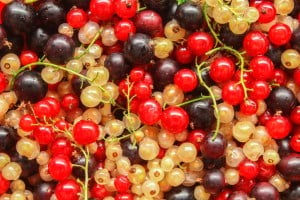 Currants:
Currants:
No, dogs should not eat currants because they are toxic and very dangerous for dogs. Even in small amounts, currants can cause serious damage and symptoms that include vomiting, diarrhea, increased thirst, weakness, and acute renal failure. If your pet ingests any number of currants, seek veterinary care immediately so that your dog’s system can be flushed out, medication administered right away, and ongoing monitoring pursued.
Dates (small amounts):
Yes, dates are safe for dogs but should be given in moderation because they are high in sugar. Unlike raisins, dates are non-toxic. They contain calcium, potassium, iron, magnesium, fiber, and vitamins A, B, and C. However, too many sugary foods, like dates, can lead to diabetes. Remove date pits before giving them to dogs so they don’t choke. Also, cut dates into tiny pieces so they are easier to chew and digest.
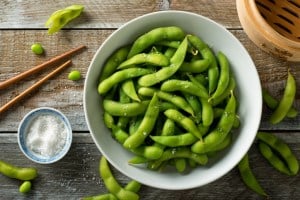 Edamame:
Edamame:
Yes, dogs can eat edamame because it is non-toxic. However, it is not recommended food for dogs on a regular basis. don’t add any sauce or salt to edamame before giving it to a dog. Soy allergies are common in dogs, and regularly eating soy may have long-term health effects, so try only a small amount to start. If tolerated, the benefits of edamame are omega-3 fatty acids, vitamin C, fiber, calcium, and fiber.
Eggplant:
Yes, eggplant is a fine food for dogs. Dogs can eat raw, grilled, baked, or roasted eggplant. Eggplant contains folate, niacin, potassium, vitamins B6 and K, and phytonutrients. It is also high in fiber and low in calories to help dogs on diets feel full. However, some dogs are allergic to eggplant, so try it in small doses. Dogs with arthritis or kidney problems should avoid eggplant because of the oxalates it contains.
 Eggs:
Eggs:
Yes, dogs can eat eggs, which are a good source of protein, amino acids, vitamins, and minerals. Make sure that eggs are cooked and not raw before giving them to dogs so you don’t risk salmonella exposure. Dogs with weight issues may need to skip eggs, so ask your vet to confirm. The healthiest ways to serve an egg to a dog is by boiling or poaching. Scrambling and frying typically involve other unhealthy ingredients.
Grapefruit:
No, it is not recommended that dogs eat grapefruit because it can cause digestive distress. Grapefruit rind is toxic to dogs because of the essential oils it contains, and the citric acid in grapefruit can cause dogs to vomit and have diarrhea. Instead of grapefruit, give your pup slices of cucumbers or tangerines as alternatives. Also, be careful where you dispose of grapefruit seeds so that your dog can’t find and eat them.
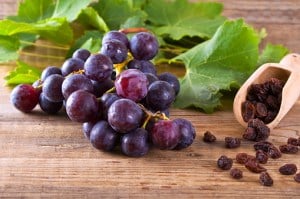 Grapes or Raisins:
Grapes or Raisins:
No, dogs can never eat raisins or grapes. Eating these foods results in a medical emergency that requires immediate treatment. Your vet will likely have to induce vomiting if your dog has consumed these foods. Even a small number of raisins or grapes can cause kidney failure, which can be fatal within a few days. The symptoms of toxicity include diarrhea, vomiting, tremors, lethargy, and increased urination. Keep these foods far from reach of dogs.
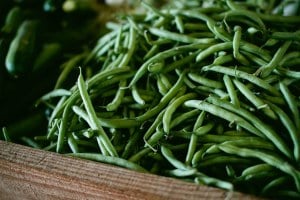
Green Beans:
Yes, green beans are a dog-friendly food. They are nutritious and low in calories, and they can be served fresh, frozen, or caned as long as there is no salt or seasonings added. Green beans are filled with protein, calcium iron, fiber, and vitamins A, B6, C, and K. Try treating your dog with green beans rather than dog biscuits to promote healthy weight loss. Talk to your vet about the “green bean diet.”
Hamburgers:
No, it is not a good idea to give your dog an entire burger to eat. However, certain components of burgers are fine to give dogs. Burger foods that are safe to give dogs are an unseasoned meat patty, bun, sesame seeds, lettuce, and tomato. You can give dogs these burger components sparingly: bacon, pickles, cheese, ketchup, mustard, and mayo. However, onions are toxic to dogs and damage red blood cells, leading to anemia.
Bacon:
Small nibbles of bacon are safe to share with your dog, but it’s best to keep it to a minimum due to the high fat and salt content.
Beef, turkey, or chicken burger patty:
A cooked, unseasoned burger patty is safe to share with your dog (and we’re pretty sure your pup will be very grateful for a taste!).
Ketchup:
Dogs should not eat ketchup due to the added ingredients such as sweeteners, garlic, and onion powder.
Mayonnaise:
Because it is typically made from oil, egg yolks, vinegar, and lemon juice, mayonnaise does not contain any ingredients that are harmful to dogs. However, due to the high fat content, it’s best to not feed mayonnaise regularly as it can lead to weight gain, stomach problems, or other health complications.
Mustard:
No, dogs should not eat mustard because mustard seeds (from which mustard is made) contain compounds that can cause inflammation and gastrointestinal upset.
Holiday Foods:
Yes, the holiday season can be toxic and hazardous to dogs. Christmas trees pose issues because of dogs chewing on branches, swallowing tinsel, eating ornaments, and ingesting needles. Garlic, onions, tomatoes, bones, fatty foods, raw dough, and foods containing xylitol all pose hazards to pets. Festive holiday plants, like mistletoe and holly, are also harmful to dogs and can cause symptoms if ingested. Keep these items out of a dog’s reach during the holidays!
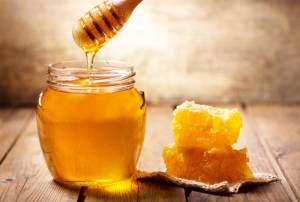 Honey:
Honey:
Yes, adult dogs can eat honey in moderation. Honey is non-toxic for dogs and contains manganese, calcium, potassium, and vitamins A, B, C, D, and E. Puppies age three month or younger should not have honey or any dogs with compromised immune systems due to botulism spores. However, healthy adult dogs can enjoy honey in small quantities. Too much honey can result in tooth decay, obesity, high blood sugar, vomiting, and diarrhea.
Honeydew:
Yes, honeydew melon is fine for dogs and non-toxic. This summer fruit is refreshing and has vitamin C, fiber, and potassium. Remove the seeds and rind before cutting it into small pieces and serving it. This is a very fiber-rich fruit, so be careful not to feed too much of it to your dog to prevent vomiting or diarrhea. It also contains natural sugars, so consult your vet before giving honeydew to a diabetic dog.
Hot Dogs:
No, it is not a good idea to feed hot dogs to your dog. While they are not necessarily toxic, hot dogs are typically packed with preservatives, salt, and seasonings that can harm dogs. Onion and garlic seasonings are especially toxic, while spicy seasonings can cause diarrhea. Hot dogs can be choking hazards for dogs and are high in fat, so avoid serving hot dogs to your pups.
Ice Cream:
No, it’s not a good idea to feed your dog ice cream. Although many dogs love it, ice cream can harm lactose intolerant dogs and affect any dogs with its fat and sugar content. Even plain vanilla ice cream can lead to an upset tummy. The worst types for dogs are chocolate and rum raisin flavors, ice creams with macadamia nuts, and sugar-free varieties that contain xylitol. Plain, unsweetened frozen yogurt is a better option.
Lemons:
No, it is not recommended to feed your dog lemons. Lemons don’t necessarily harm dogs, but they often cause gastrointestinal distress. Lemon seeds and peels also pose choking hazards, and the citric acid in lemons can be too much for a dog’s digestive system to handle. Instead of feeding lemons to your dog, consider using them as a natural flea and tick repellant. Lemon is a common ingredient in all-natural pest repellants.
Lettuce:
Yes, it’s fine to give your dog lettuce. Although you shouldn’t prepare your pup a full salad with toppings, leafy vegetables are generally okay, such as romaine, iceberg, and arugula. These foods are mostly water and serve as a low-calorie snack or training treat for overweight dogs. Make sure lettuce is properly washed and leave out any salad additions or dressings. Choose lettuce over dark leafy greens, like spinach and kale, for your dog.
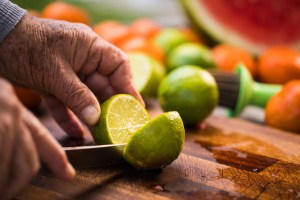 Limes:
Limes:
No, you should not feed limes to your dog. Although limes have lots of vitamin C and antioxidants, they are likely to cause choking or an upset tummy in dogs. The peel contains essential oils that are dangerous for dogs and can lead to poisoning. Symptoms of eating lime peels include lethargy, low blood pressure, and liver failure. If your dog eats limes, seek veterinary care immediately. Always keep limes out of reach of dogs.
Mangoes (small amounts):
Yes, your dog can have mangoes in moderation due to the high sugar content. Only serve a dog the fruit with the skin peeled and without the pit. The pit of a mango is not toxic but it is a choking hazard. This exotic fruit contains vitamins A, B6, C, and E, as well as fiber to benefit your dog’s health. Mangoes are recommended for dogs that are constipated because of their high fiber content.
Mushrooms:
No, pet parents should not give wild or store-bought mushrooms to dogs. If your dog eats a wild mushroom in the outdoors, try to remain calm, collect a sample of the mushroom, and call your vet or an animal ER immediately. Store-bought mushrooms pose less of a risk but should still be avoided out of caution. Many types affect a dog’s gastrointestinal tract, while amanita mushrooms cause liver and central nervous system damage.
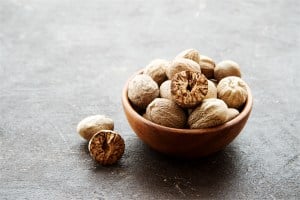 Nutmeg:
Nutmeg:
No, do not give nutmeg to dogs because it’s toxic. This spice contains myristicin, which is toxic in large quantities but doesn’t usually cause serious issues in very small amounts. Symptoms of toxicity include increased heart rate, disorientation, high blood pressure, dehydration, and seizures. A baked treat with nutmeg may cause mild stomach symptoms and also should be kept away from dogs because of other potentially harmful ingredients, such as raisins and chocolate.
Onions:
No, dogs should definitely never eat onions. As members of the Allium family, onions are toxic and can be life-threatening for dogs. The N-propyl disulfide compound in onions damages red blood cells and can cause them to rupture and result in anemia. Symptoms of eating onions include weakness, pale gums, increased heart rate, red or brown urine, drooling, vomiting, and diarrhea. Also, avoid onion powder and any broths or meats cooked with onions.
Oranges:
Yes, it is fine to feed an orange to your dog. Orange, including tangerines, mandarin oranges, and clementines, provide a dog with vitamin C, fiber, and potassium. However, you should limit the amount of oranges your dog consumes because they can cause diarrhea and gastrointestinal upset. Oranges have a lot of sugar, which can be a problem if your dog has diabetes. Orange peels are non-toxic but remove them for safety.
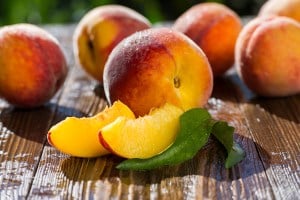 Peaches:
Peaches:
Yes, dogs can eat peaches but pet owners should proceed with caution. Peaches are known to cause an upset stomach or diarrhea in dogs, and the pits contain cyanide that is toxic to dogs and also a choking hazard. However, the flesh of a peach contains vitamins A and C, as well as fiber, which are beneficial for dogs. Choose fresh peaches over canned ones to avoid giving your dog unnecessary sugar.
Peanut Butter:
Yes, dogs can eat peanut butter safely and often love it. Peanut butter has vitamins B and E, protein, and niacin and is vet-approved. Unless your dog has a peanut allergy, it’s great to put inside a Kong toy to keep a dog busy. However, not all peanut butters are equal. Choose ones that are raw, unsweetened, and unsalted. Avoid sugar-free and light peanut butters that have artificial sweeteners that can be toxic for dogs.
Peanuts:
Yes, you can feed peanuts to dogs if they are unsalted and roasted or raw. Never feed peanut shells or seasoned peanuts to a dog, however. Peanuts provide protein, vitamin E, vitamin B-6, niacin, and healthy fats for dogs. However, they can cause pancreatitis if eaten in excess or put your dog at risk of salt poisoning if the peanuts are salted. Peanut butter is safe for dogs if it is unsweetened, unsalted, and raw.
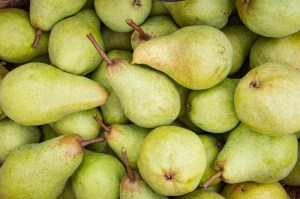 Pears:
Pears:
Yes, pears are safe for dogs and a healthy natural snack. The nutrients in pears include potassium, fiber, antioxidants, and vitamins A, C, and K. Make sure to remove the core and seeds of the pear before giving it to your dog. Skip pears if your dog is diabetic because of the sugar content. For something special, try making homemade baked dog treats with pears, honey, coconut oil, coconut flour, and water.
Peas:
Yes, dogs are able to safely eat peas, including snow peas, sugar snap peas, and English peas. Peas are a common food in commercial dog food. As long as they’re free of sodium and plain, dogs can eat them frozen, fresh, or boiled. Peas offer protein, antioxidants, fiber, and vitamins, A, B, and K. Try giving peas as a treat instead of high-calorie biscuits. don’t give peas to dogs with kidney problems due to purines.
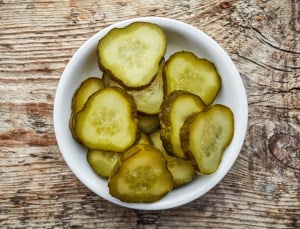 Pickles:
Pickles:
No, you shouldn’t intentionally feed your dog pickles, but if she gobbles up a dropped one, it should be okay. Pickles are often made with onions and garlic that are toxic to dogs. They can have a high salt or sugar content, which is also not good for dogs. Pickles are frequently soaked in vinegar, which is another food on the “no” list for pups. Avoid giving dogs pickle juice as well.
Pineapple:
Yes, dogs can eat pineapple in moderation. Choose fresh pineapple over the canned version though to avoid excess sugar. Cut raw pineapple into small pieces to give them the benefits of vitamin B6, vitamin C, thiamin, niacin, iron, magnesium, potassium, folate, manganese, copper, and riboflavin. Just make sure to remove the tough and spiny skin of the pineapple because it is difficult to digest and can cause an obstruction.
Pomegranate:
Yes, you can feed pomegranate to your dog, but only in very small amounts. Proceed with caution because pomegranate often makes dogs sick. It’s not poisonous to dogs, but the fruit seeds can cause a tummy ache and vomiting. Be careful to monitor your dog while eating pomegranate to prevent accidental swallowing. The peel of a pomegranate is too hard for a dog to digest and is a choking hazard, so discard this portion.
Popcorn:
Yes, dogs can eat popcorn in moderation every once in a while. It is high in fiber, carbohydrates, magnesium, zinc, manganese, and phosphorous. Just avoid giving your dog any popcorn with salt, butter, seasonings, or oils to avoid upset stomach and increase the risk of obesity. Only give dogs fully popped pieces because kernels can choke dogs and get stuck in teeth. Also, keep popcorn bags away from dogs to prevent suffocation.
Pork (unseasoned):
Yes, dogs can safely eat pork if unseasoned. Pork is a source of protein, vitamin B12, vitamin C, selenium, zinc, phosphorus, and niacin. It is important, however, to avoid garlic and onion seasoning on pork because they can cause upset stomachs and anemia. don’t feed dogs raw or undercooked pork because to avoid parasitic infections. Processed pork products, such as bacon and ham, are high in fat and salt, which makes them unhealthy for dogs.
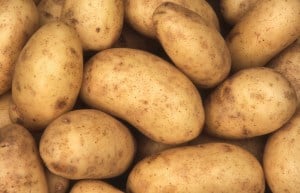 Potatoes:
Potatoes:
Yes, dogs can eat plain baked or boiled potatoes, but raw potatoes shouldn’t be given to dogs. Potatoes provide dogs with carbohydrates for energy, iron, potassium, and vitamins A, B, and C. Avoid unripe potatoes because potatoes are members of the nightshade family and can be toxic if unripe. With potatoes, avoid seasoning and high-fat additions that humans love, like bacon bits and sour cream. Allow in moderation only due to the high carbohydrate content.
 Pumpkin:
Pumpkin:
Yes, you can give your dog the fall-favorite treat of pumpkin. It is a member of the squash family, and full of protein, copper, magnesium, fiber, beta carotene, and vitamins A, C, and K. Pumpkin is beneficial for dogs that experience diarrhea and constipation because it balances the digestive system. Fresh or canned pumpkin is fine as long as it’s plain. Dogs can also eat raw or roasted pumpkin seeds that are plain.
Radishes:
Yes, you can feed radishes to your dog in moderation. Radishes are non-toxic and a good source of potassium, vitamin C, and fiber. They can also remove plaque from your dog’s teeth because of their rough texture. Dogs who enjoy food rewards and benefit from stimulation do well with crunchy vegetables, like radishes. However, not all dogs like the taste of radishes or prefer the flavors of carrots and sweet potatoes.
Rawhide:
Yes, rawhide can be safe for dogs but only if you choose products that are not overly processed with chemicals. Aggressive chewers should not be given rawhide because it can cause intestinal tears and blockages. Carrots are a good natural alternative to rawhides. Bully sticks, yak’s milk chews, fish skin sticks, and antlers are also good options. Talk to your vet about your dog’s chewing habits to find a treat that is safe and recommended.
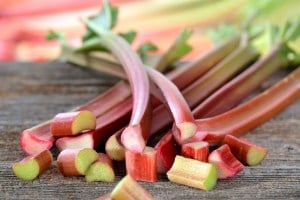 Rhubarb:
Rhubarb:
No, it’s not a good idea to intentionally feed rhubarb to your dog, but if he gets a dropped scrap, it should be fine. The stalks of rhubarb are safe for dogs but the leaves are poisonous. Rhubarb is high in fiber, low in calories, and contains vitamin C, manganese, and potassium. Due to the toxicity of the leaves, it’s best to keep pets away from rhubarb in the house and outdoors in your garden.
Salmon:
Yes, most cooked fish, including salmon, is safe to give to dogs. Salmon contains omega-3 fatty acids that are good for coats and hearts, is high in protein, and contains other vitamins and minerals too. don’t give raw salmon to a dog because it can cause gastrointestinal issues and even death. Also, remove bones from fish because they are a choking hazard. Salmon skin is safe but high in fat, so only give it sparingly.
Salt or Salty Foods:
No, salt and salty foods are not recommended for dogs. These foods cause dehydration, diarrhea, nausea, vomiting, and serious health complications in excess. Yet sodium is a natural part of a dog’s diet and necessary at moderate levels to balance bodily fluids and help nerves function. Ask your vet how much salt your dog should be getting. Salt poisoning can result in a swollen stomach and a dog seeming very tired or having stiff muscles.
Seaweed:
Yes, dogs can eat commercially produced seaweed that’s plain or in supplement form. But don’t let your dog eat seaweed found on the beach because it can expand in the digestive system and cause potentially fatal blockages. Wild seaweed can also contain pollutants and harmful organisms. Non-wild seaweed is nutritious and contains omega-3 fatty acids, iron, iodine, vitamin B12, and magnesium. You can sprinkle a seaweed supplement on your dog’s food for these benefits.
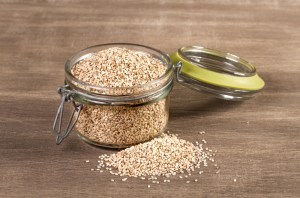 Sesame Seeds:
Sesame Seeds:
Yes, sesame seeds are safe for canines to eat in moderation. You’ll find these tiny seeds in hamburger buns, energy bars, and other human foods. They contain calcium for strong bones, copper for joint health, and antioxidants to prevent disease. However, overconsumption in dogs can cause bowel irritation, vomiting, and diarrhea. There are some great homemade dog treat recipes that you can try to incorporate sesame seeds into your dog’s diet.
Spinach (small amounts):
Yes, small amounts of spinach are safe for dogs. Spinach contains vitamins, A, B, C, and K, as well as iron, fiber, and beta carotene. Dogs can eat cooked or raw spinach, but steaming is the best option to preserve nutrients. However, spinach does contain oxalates that can cause bladder and kidney stones if consumed in large quantities. Choose organic spinach for your dog to avoid pesticide exposure, and wash it thoroughly before serving.
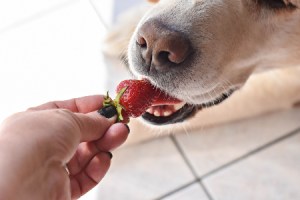 Strawberries:
Strawberries:
Yes, strawberries are safe for dogs to eat and also beneficial because they contain fiber, antioxidants, and vitamin C. Strawberries are good for a dog’s teeth too. Only feed your dog a few of these delicious berries to avoid an upset stomach though. Choose fresh strawberries instead of canned ones to avoid excess sugar and xylitol, which is toxic for dogs. There are even delicious dog-friendly recipes with strawberries to try.
Sugar:
No, you should not feed your dog granulated sugar or sweet treats. Natural sugar from many fruits is safe for dogs. However, granulated sugar can put dogs at risk of weight gain, diabetes, cavities, and metabolic conditions. This can lead to heart complications, arthritis, oral infections, and many more health conditions. So, skip sugar when feeding your dog because it is not necessary and causes more harm than good.
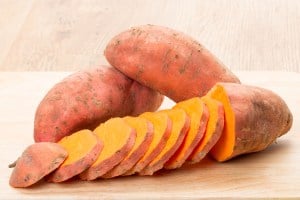 Sweet Potatoes:
Sweet Potatoes:
Yes, you can safely give your dog sweet potatoes. This is a favorite food of dogs and filled with fiber and vitamins A, B6, and C. The firm kind with gold skin and pale flesh, as well as the soft kind with copper skin and orange flesh, are both fine for dogs. Sweet potatoes are healthier than white potatoes for your pup. Make sure that the sweet potatoes don’t have added salt, seasoning, or oils.
Thanksgiving Foods:
Yes, there are delicious foods that dogs can enjoy with you for Thanksgiving. These include sweet potatoes, turkey, green beans, carrots, pumpkin, rolls/bread, and apples. But make sure to monitor what your dog eats on Thanksgiving because diarrhea in dogs is very common due to overeating rich foods. Too much can result in pancreatitis, which can be life-threatening and costly to treat. Try making Thanksgiving-themed, homemade dog treats instead of unhealthy options!
Tomatoes:
No, you should generally not feed tomatoes to your dog, but plain ripe ones with the greenery removed may be okay. Tomatoes are low-calorie foods with lycopene, beta-carotene, vitamin C, fiber, folate, and potassium. However, they are members of the nightshade family and contain solanine, which is toxic in the leaves and stems. Some pups are also allergic to tomatoes. Tomato soups and sauces are high in salt and sugar and should be avoided.
Turkey Bones:
No, turkey bones are not safe for dogs. They are enticing to pups but are a hazard and can cut your dog’s gastrointestinal tract and cause severe damage. Dogs can choke on turkey bones, and the bones can become stuck in the esophagus or stomach, become lodged in the teeth or jaw, and cause intestinal blockages. Thoroughly seal trash cans to prevent dogs from getting into the trash and finding turkey bones on their own.
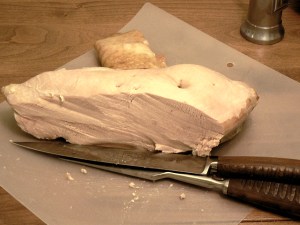
Turkey (unseasoned):
Yes, plain turkey without seasonings or salt is safe for dogs. Choose the white meat of turkey with excess fat and skin removed for the best source of protein and nutrients. Fatty areas of turkey legs and turkey skin can lead to pancreatitis, which is painful and cause vomiting and diarrhea. Plain ground turkey is also safe for dogs. However, you should make sure to remove all of the bones that pose a choking hazard.
Vegetables:
Yes, dogs can eat many different types of vegetables. Good vegetables for dogs include bell peppers (red, green, and yellow), asparagus, broccoli, Brussels sprouts, bok choy, cauliflower, celery, corn, cucumber, lettuce, peas, potatoes, and pumpkin. Other dog-safe foods are spinach, sweet potato, squash, zucchini, green beans, cabbage, carrots, and cauliflower. However, keep garlic, onions, mushrooms, rhubarb, and tomatoes away from dogs because they are dangerous.
Vinegar:
No, it is not a good idea to give vinegar to dogs. This is because some dogs do not react well to vinegar, and you may not know until it’s too late. Undiluted vinegar can cause gastrointestinal upset for dogs that are small, have kidney disease, sensitive stomachs, or other issues. Vinegar is generally okay for cleaning if you dilute it with water and close your dog off from a room when you’re cleaning.
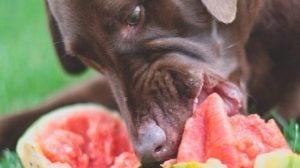 Watermelon:
Watermelon:
Yes, you can feed the refreshing summertime treat of watermelon to your dog. Watermelon is a hydrating snack, which is good to know for preventing heat stroke on hot days. However, you need to remove most of the seeds and not let your dog eat the rind because these parts of the fruit can cause intestinal discomfort and upset tummy. Watermelon is a good way to give your dog extra vitamins A, B6, and C.
White Chocolate:
No, do not feed your dog white chocolate. Although it is not as toxic as dark chocolate, it is still dangerous and can cause serious symptoms like seizures and heart attack. White chocolate is also high in fat and sugar, which can lead to pancreatitis, weight gain, and urinary tract infections. Call your vet or pet poison control if your dog eats any amount of white chocolate because the vet may need to induce vomiting or administer and IV.
Xylitol:
No, dogs cannot have xylitol because it is one of the most toxic ingredients for dogs. Gum, sugar-free peanut butter, toothpaste, chewable vitamins, and many other human foods contain xylitol. It is prevalent in low-fat and sugar-free products. Xylitol stimulates the pancreas to produce too much insulin, causing blood sugar to drop dramatically. Diabetic dogs are especially prone to this. It is essential to visit a vet or emergency clinic immediately after xylitol pet poisoning.
Yogurt:
Yes, dogs can eat yogurt as long as they are not lactose intolerant. In fact, yogurt is very good for dogs because it is high in protein and calcium, and it has probiotics and aids digestion and immunity too. Give your dog plain, unsweetened and unflavored yogurt that is low fat and has live bacteria. Greek yogurt is also a great choice because it is higher in protein and lower in sugar and salt.
